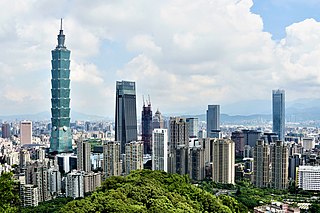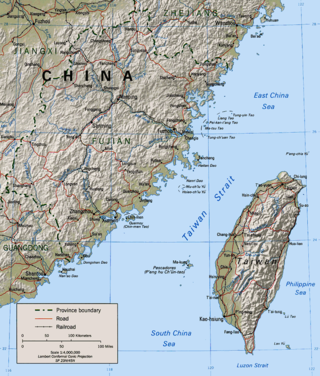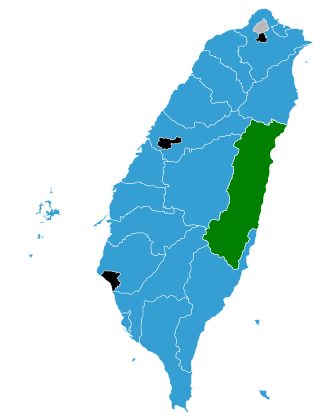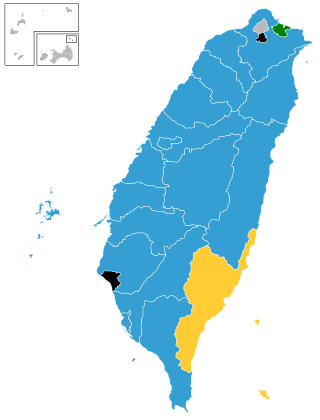
The Kaohsiung Incident, also known as the Formosa Incident, the Meilidao Incident, or the Formosa Magazine incident, was a crackdown on pro-democracy demonstrations that occurred in Kaohsiung, Taiwan, on 10 December 1979 during Taiwan's martial law period.

Chen Ding-nan, sometimes transliterated Chen Ting-nan or referred to as David Chen, was an environmentalist, Taiwanese statesmen and Minister of Justice noted for his efforts to fight corruption and characterized as a leader of the country's anti-nuclear movement. Due to the 9–13 July 2002 state visit to the United States of America Chen became the first Taiwan government official since 1979 to have been invited into the White House.

Kiku Chen Chu is a Taiwanese politician serving as president of the Control Yuan and Chair of the National Human Rights Commission since 2020. Before assuming her current post, Chen had served as Secretary-General to the President from 2018 to 2020 and Mayor of Kaohsiung from 2006 to 2018, making her the longest-serving mayor of the city since the Japanese occupation of Taiwan.

Su Nan-cheng was a Taiwanese politician and Senior Advisor to ROC President Chen Shui-bian. He was a mayor of Tainan, serving from 1977 to 1985, and an appointed mayor of Kaohsiung, serving from 1985 to 1990. He was the speaker of the ROC National Assembly in 1999. Su was in the Kuomintang and was part of the faction that supported the Taiwanese localization movement. He was expelled from the KMT twice: first in 1972 for violating a party resolution and running for Tainan City Mayor as an independent; second in 1999 for forwarding a term-extension amendment in the National Assembly against party orders. In 2003, Su openly supported DPP candidate Chen Shui-bian in the 2004 presidential election.

Local elections were held in Taiwan on 27 November 2010 to elect mayors, councillors, and village chiefs of special-municipalities, known as the Five Municipalities Elections. Mayoral candidates for the Kuomintang were elected in New Taipei, Taipei, and Taichung, while candidates for the Democratic Progressive Party were elected in Kaohsiung and Tainan. On the eve of the election, Sean Lien, son of former Vice President Chan Lien, was shot in face when he was campaigning for a Kuomintang New Taipei councillor candidate.

In Taiwan, the North–South divide refers to the uneven distribution of resources in regard to political, wealth, medical, economic development, education and other aspects across the country over past decades that has drawn the social and cultural differences between Northern Taiwan and Southern Taiwan today.
The 2018 Taiwanese municipal elections for both mayoral and magisterial candidates were held on 24 November 2018, as part of the larger local elections in Taiwan.
By-elections for the Ninth Legislative Yuan were held in 2019, two on 27 January and four on 16 March, at Taiwan to elect 6 of the 113 members of the Legislative Yuan for the remaining term until 2020.

The Fujian–Taiwan relations, also known as the Min–Tai relations, refers to the relationship between Fujian, which is located in mainland China, and Taiwan, which is across the Taiwan Strait. Since the average width of the Taiwan Strait is 180 kilometers, Fujian and Taiwan are adjacent, similar in both climate and environment. Although the relationship between Taiwan and Fujian has changed with the development of history, the two places have maintained close relations in terms of personnel, economy, military, culture and other aspects. At present, Taiwan residents are mostly descendants of immigrants from mainland China, of which the southern Fujian ethnic group is the main group, accounting for 73.5% of Taiwan's total population. In terms of culture, language, religion, and customs, Fujian and Taiwan also share similarities.

Hsu Kun-yuan was a Taiwanese politician. He was born in Kaohsiung, Taiwan. He was a member of the Kuomintang (KMT). He was a member of the Kaohsiung City Council from 1994 until his death. From 2010 to 2014 and again from 2018 until his death, he was Speaker of the City Council.

Lien Chen-tung was a Chinese statesman and politician who was the tenth Republic of China Minister of the Interior. Lien was also the first official county magistrate of Taipei County, a representative of the National Assembly, a member of the Executive Yuan, and a national policy advisor to the Office of the President. His son Lien Chan was the seventh Vice President of the Republic of China and a former Chairman of the Kuomintang.
Local elections of Taiwan were held in 1997 and 1998 to elect magistrates of counties and mayors of cities on 29 November 1997, and mayors and councillors of special municipalities on 5 December 1998.

Local elections were held in Taiwan in 1950 and 1951, months after Chiang Kai-shek resumed duties as President of the Republic of China following the civil war defeat, marking the start of local autonomy in the post-war era.

Local elections were held in Taiwan in 1954, the second nation-wide elections in the post-war era of Taiwan, electing all 21 mayors of cities and magistrates of counties. Election for Provisional Taiwan Provincial Council was held alongside the local elections to elect 57 councillors.

Local elections were held in Taiwan on 21 April 1957, the third nation-wide elections in post-war Taiwan, electing all 21 mayors of cities and magistrates of counties with a three-year tenure. Fuchien Province, then under military administration, was not up for election. Election for Provisional Taiwan Provincial Council was held alongside the local elections to elect 66 councillors.

Local elections were held in Taiwan on 24 April 1960, the fourth nation-wide elections in post-war Taiwan, electing all 21 mayors of cities and magistrates of counties with a four-year tenure. Fuchien Province, then under military administration, was not up for election. Election for Taiwan Provincial Council was held alongside the local elections to elect 73 councillors.

Local elections were held in Taiwan on 26 April 1964, the fifth nation-wide elections in post-war Taiwan, electing all 21 mayors of cities and magistrates of counties with a four-year tenure. Fuchien Province, then under military administration, was not up for election.

Provincial and municipal elections were held in Taiwan on 3 December 1994, electing the Governor of Taiwan Province, and mayor of two special municipalities.

Local elections were held in Taiwan on 19 November 1977, electing 20 magistrates and mayors in the country, 77 members of the Taiwan Provincial Council, and members of the Taipei and Kaohsiung City Council.

















